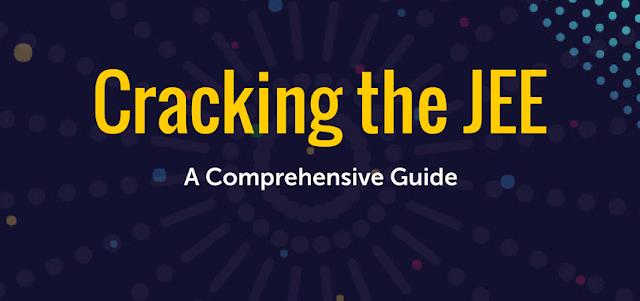A Comprehensive Guide to Cracking the JEE
A Comprehensive Guide to Cracking the JEE
The Joint Entrance Examination 2018 (JEE-2018) is just around the corner and a cloud of tension will inescapably haunt every JEE aspirant as each day passes by. The prime challenge that one faces is that of managing / balancing time to study for both Board exams and the JEE. Furthermore, you are expected to write the entrance exam soon after your Boards exams giving you a small window to prepare for the JEE. So, when JEE comes knocking at your door, don't lose heart, all you need is a foolproof plan to start your preparation in full swing from today and make the best possible utilization of time. Read on to understand how you can establish a plan to achieve the goal of acing the JEE examination.
A Foolproof Study Plan: Organised Preparation is KEY
First things first, know all the important dates and timelines pertaining to the JEE examination. This will help you plan your approach to conquer the examination along with calculating the effort that you will have to put in each day.
A good strategy is often the crucial factor that differentiates success and failure. Adopt organized preparation as a strategy and ensure that each day counts.
Here's a checklist of must-do items when preparing for the JEE and formulating an effective study plan
1. Make sure you plan out for the entire JEE and Board syllabus. JEE is a superset of Boards when it comes to Physics, Chemistry, Mathematics but you need to apportion time for other subjects that will be in your Board Exams as well
2. Set deadlines to complete each topic. Measure your progress as you go along
3. Adopt a systematic learning method. Try to plan out your study keeping in mind the time available and the topics to cover in the given time frame.
4. Create notes and mind-maps while studying. These will become vital when it comes to revision.
5. Last but not the least, make sure you include recreation in your schedule because all work and no play can be exhausting and in most cases, even counterproductive.
Effective Preparation: Staying focussed on your goals and working towards them
Now let's take a deep dive into understanding how to effectively drive your focus as it is going to be THE crucial part of JEE preparation.
Identify your STRONG and WEAK Topics
It's vital to take a hard look at yourself and identify your strong and weak topics. Break it down from a subject level into a topic level. This way, you'll be able to have a laser-sharp focus on what needs to be done. Make a list of these topics and make sure you prepare a timetable that allocates time efficiently with a higher weightage given to the topics you're weak at.In addition, you should also look at the important topics for JEE and prepare your timetable accordingly.
Identify and acquire the best study material
You will need to primarily give weightage to your NCERT books period. This is because JEE Main is organized by CBSE. So, the exam certainly is based on the content provided in these books.
Gather a list of practice questions as well and old question papers so that you know what questions are asked. A further list of reference books by subject has been shared at the bottom of this article.
Weighing Quality over Quantity: JEE demands understanding and application of logic
You must have heard the adage of how quality matters over quantity time and again. A JEE aspirant must take this to heart because only quality preparation can help you achieve your goal regardless of the countless hours you invest in reading your books.
You will have to adapt to the practice of embracing concepts qualitatively. An eager approach towards JEE preparation may force you to hoard concepts even if it means not understanding them properly. This can backfire and your preparation can go wrong. JEE is definitely not at all about superficialities; it tests your conceptual knowledge to the core. This means absolutely mastering the topics. Thus, you must go to the root of concepts and clear any and all doubts instantaneously and constantly to make sure you can handle any question on that topic
Reinforcing a positive mindset
It is said that poor performances during an examination can be traced back to a negative mindset, usually in the form of stress, anxiety and a lack of self-belief. While preparing for the exam always remember that stress and anxiety are normal, but what you choose to do with it is what matters. You could let it be your downfall or use it to drive you to improve your work. Use these tips and use it to leverage your anxiety and stress and reinforce a positive mindset.
1. Exam worries often come from a fear of the unknown. Not knowing what to expect under exam conditions can create panic. Overcome this by studying past examination papers to get a realistic idea of what is about to come.
2. Organised approach: Being organized should be a part of your strategy. Small attributes like organizing your written material into subheadings, charts, bullet points, and diagrams can help you clear the clutter. By breaking up your work, exam preparation becomes more productive
3. Fear of mistakes is an obvious trigger to stress and unfortunately, mistakes are an unavoidable component of exams. So keep learning from your mistakes as you practice sample papers and experience failure as a feedback to stay positive
You may also be interested: Choose the Professional Institute for Professional Training Courses Supporting IT Set Up
The DON'Ts while preparing for JEE:
Purely as a precaution, here's a list of the common mistakes made by students who prepare for JEE entrance so that you stay steer clear of these errors.
1. Ignoring NCERT Books
2. Failing to make or stick to a Timetable
3. Ignoring Chemistry and focussing only on Math and Physics
4. Ignoring theory in Maths and Physics
5. Hoarding reference material but not completing any thoroughly
6. Moving on without understanding concepts thoroughly
Addendum: List of reference books:
Picking the right books for Cracking the JEE
Only after you have mastered your NCERT books is it recommended to move on to these reference books. Here is the list of books that you can refer to understand the topics and practice problems. These are the books recommended by teachers and IITians.
Best Physics Books for JEE Preparation:
Concepts of Physics by H. C. Verma (Part 1 & 2)
IIT-JEE Physics by D.C Pandey
Fundamentals of Physics by Resnick, Halliday, and Walker
Problems in General Physics by I. E. Irodov
Once you have finished the NCERT Physics books, start studying from H.C. Verma's book because it provides a lot of questions at the end of the chapter graded in difficulty level. An honest attempt to solve them can help you a great deal.
Simultaneously, try the Halliday, Resnick and Walker's book. This book has a great reputation worldwide because each chapter offers few conceptual questions which again can help in building a strong foundation.
I.E. Irodov's book is one of the toughest books in Physics. It is very useful for problems in Mechanics and Electromagnetism for the IIT JEE Preparation.
Best Chemistry Books for JEE Preparation:
Chemistry is divided roughly into a) General Chemistry with a huge emphasis on Physical Chemistry, b) Organic Chemistry and c) Inorganic Chemistry.
Organic Chemistry by Morrison and Boyd for Organic Chemistry
Organic Chemistry by Solomons and Fryhle for Organic Chemistry
Concise Inorganic Chemistry by J. D. Lee for Inorganic Chemistry
Modern Approach to Chemical Calculations by RC Mukherjee
Best Mathematics Books for IIT JEE Preparation:
Higher Algebra by Hall and Knight for Algebra
Coordinate Geometry by S.L. Loney
Differential and Integral Calculus by N. Piskunov
Calculus and Analytic Geometry by Thomas and Finney for Calculus
IIT Mathematics by M.L. Khanna
Course in Mathematics for IIT-JEE by Tata McGraw Hill publications
Problems Plus in IIT Mathematics by A Das Gupta
Trigonometry by S L Loney
I hope this guide has shed some light on how to plan and strategize your preparation for JEE 2018.




Comments
Post a Comment